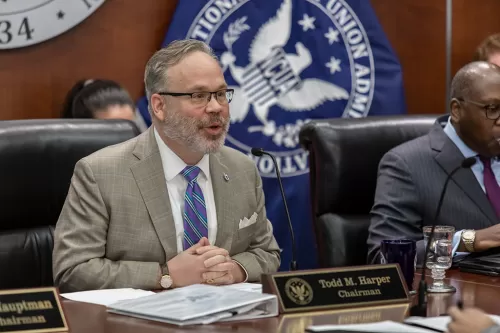NCUA Chairman Todd M. Harper during a meeting of the NCUA Board.
As Prepared for Delivery on May 25, 2023
Thank you, Justin, for your presentation on the proposed rule to amend the charitable donation accounts section of the NCUA’s incidental powers regulation and for your work in bringing this proposal before the NCUA Board. This proposed rule would allow federal credit unions to better serve America’s veterans. And, with the Memorial Day holiday upon us, now is an ideal time for the NCUA Board to consider this matter.
The current charitable donations account regulation was created nearly a decade ago to allow credit unions to develop charitable giving accounts that could be funded with investments otherwise impermissible for federal credit unions. The current rule requires these funds to go to a “qualified charity,” as defined by the Internal Revenue Code. But the charities that support our nation’s veterans, their families, and survivors fall under a different regulation under the Internal Revenue Code. This left credit unions that wanted to support veteran organizations unable to use the charitable giving accounts for that purpose. While nothing prevented credit unions from donating to veteran organizations, the current structure may have ultimately been a deterrent.
Last year, the Defense Credit Union Council, along with the Veterans of Foreign Wars and other trade groups, wrote in a letter to the NCUA Board, “To increase the number of credit unions that participate in charitable giving and [to] better serve our nation’s veterans, we request that the NCUA amend the definition of “qualified charity.” *** Many credit unions include members of the armed services within their Field of Membership and include giving back to the community within their mission.”
The letter went on to explain, “[Charitable Donation Accounts] provide an excellent tool for [federal credit unions] to engage in limited investments that would otherwise be prohibited by the Federal Credit Union Act. Because these investments are for the express and primary purpose of funding charitable donations, distributions from the [charitable donation account] are inherently low-risk and financially prudent.”
To correct this situation and provide a new tool for credit unions to better serve their members, the Board is today proposing to add veterans’ organizations, as defined in the Internal Revenue Code, to the definition of a “qualified charity” that a federal credit union may contribute to using a charitable donation account. The Board is also asking if there are other groups, entities, or organizations that it should consider adding to the definition of a “qualified charity” to inform future rulemaking in this area. I encourage stakeholders across the credit union system to provide the NCUA with comments on this issue.
Within the credit union system, we have many credit unions with fields of membership that specialize in serving military branches, military bases, and defense-related organizations. With this proposed rule change, we will allow them to better serve their members and fulfill their missions. That’s good for veterans, good for military families, good for credit union members, good for credit unions, and good for our country.
In conclusion, this proposed rule is one that just makes sense. And it fits perfectly within the credit union ethos of “people helping people” that underlies the entire system of cooperative credit within the United States. I will strongly vote in favor of this proposal.
That concludes my remarks. I now recognize Vice Chairman Hauptman, who has championed this proposed rulemaking.



